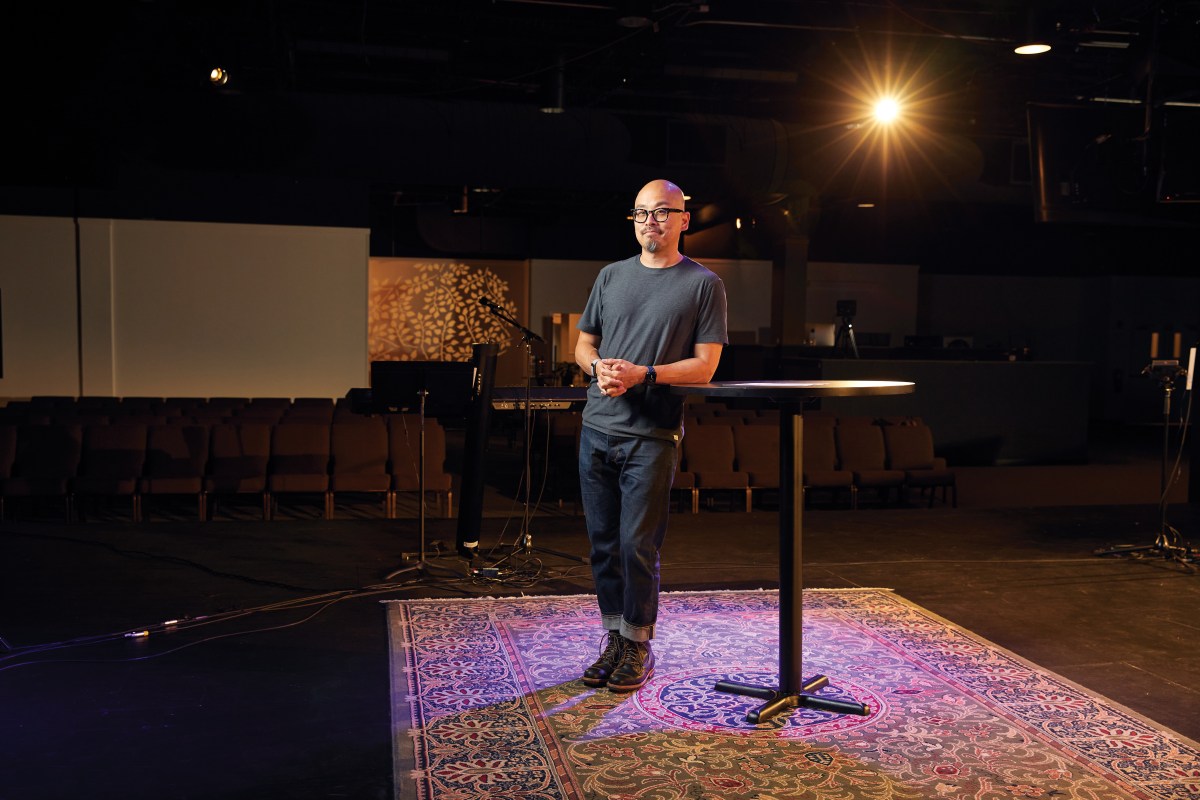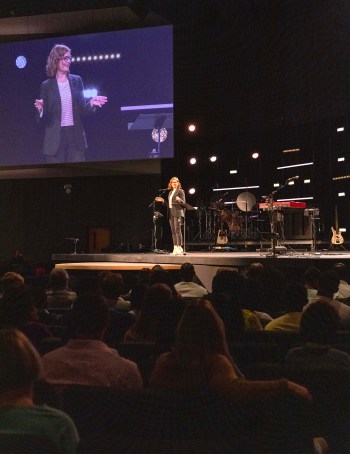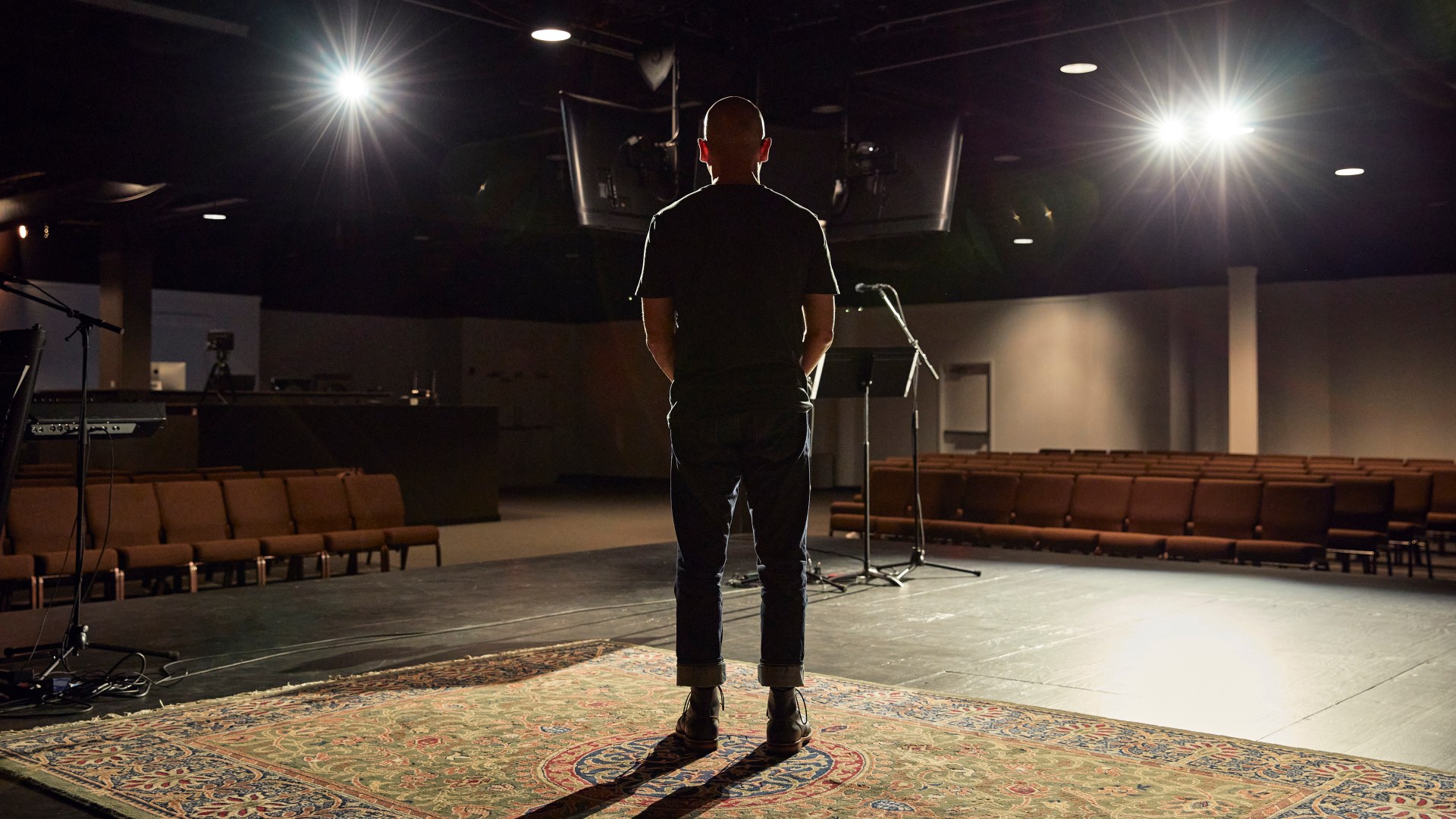A lot of churches go through a stage of change when they get a new lead pastor. But Ted Kim actually wanted to change the stage.
The new leader of the Vineyard church in Evanston, Illinois, a suburb north of Chicago, wanted to get rid of it, just completely rip out the stage. Instead of the high platform at the front, he would put the stage in the middle of the sanctuary, with the seats arranged in a circle around it, so the congregation could see each other and participate with each other more in worship. The stage would also be lower, just a few inches above the ground, to reduce the elevation of the minister and the iconography of authority and power.
He’d been thinking about this for a long time—how to reorganize church. He thought about it as a kid growing up in the Korean Presbyterian congregation that his immigrant parents loved; as a college student in New York when he first experienced charismatic worship; in Chicago in seminary when he started to be discipled by the Vineyard pastor in Evanston; and when he got called back to lead that church in 2019.
Kim wondered: What would it look like for a church to be organized around the beauty of the Lord? What should church look like for a new movement of the Spirit for a new generation?
So when he had a chance to make changes in Evanston, he had a bold vision for what he could do. It was the kind of bold vision that the Vineyard, a charismatic denomination that started in the mid-1970s in Southern California, has long celebrated. People in the movement tell each other stories about leaders who didn’t wait for approval, call for a study, form a committee, or let themselves be checked by tradition or “how things are done.” They just listened to the Holy Spirit and did stuff.
So what Kim did next was surprising. He did nothing.
Not nothing. He prayed. And then after weeks or maybe months of praying, he started asking people what they thought about the organization of the sanctuary’s space. How did it shape worship? How did it form Christian community and people’s spirituality? He asked people what other forms of worship they’d experienced and what they thought of them. What could worship at Evanston Vineyard look like?
 Kevin Penczak
Kevin PenczakA transformation is coming to the Vineyard. More than 10 percent of the denomination’s 545 churches have gone through a leadership transition in the past year, according to official records. And more than a third of its senior ministers are over the age of 60, moving toward retirement. The founding generation is starting to turn things over, one church at a time.
In fact, this shift is happening across American evangelicalism. Baby boomers are stepping down. They were a large generation that exerted a lot of influence over evangelicalism and, more broadly, American approaches to doing church. But now, the institutions they built, the churches they grew, and the ministries they launched are being handed over to Gen Xers and elder millennials.
“It might be good, bad, or weird, but man, it’s happening,” said Jay Pathak, the Vineyard’s national director, himself a Gen Xer who took leadership of the denomination in January 2022.
Generational change happens so slowly it can be hard to see. A megachurch pastor announces the search for a successor, a TV ministry leader steps down, and a prominent Christian passes away, but the bigger picture of how things will be different remains elusive.
In the Vineyard, however, the broader developments have become very visible. Ever since the movement was started in the 1970s and grew rapidly in the ’80s, it has been defined, shaped, and shepherded by the generation that was born after World War II and came of age in the cultural upheavals of the 1960s. Many pastors in the movement planted their own churches and stayed at those churches their entire careers. Now they’re leaving almost all at once.
The new leaders are younger, of course, but they’re also more diverse. More are women and minorities. And they’re thinking about leadership very differently.
They’re more committed to collaboration, more interested in consensus, and more invested in team. They go slow. They do a lot of listening. Compared to their predecessors, they’re less focused on making decisions and being decisive. They think being a good leader means managing anxiety, holding it to create space for the Christian community to discern the leading of the Holy Spirit.
“Boomers were mostly asking, How do I get a wide-open space where I can flex and do my thing?” Pathak said. “Where, the younger a leader is right now, the more they want to be on a team. They want to use their gifts for something larger. … I think it looks like God’s kingdom—mutually submitting for the mission and what God wants to do. I think that’s the thing God is giving us the grace to do.”
It’s impossible to know for sure what this new generation of leadership will mean for the church in Evanston, the Vineyard, or evangelicalism more generally. But as Christians across the country reckon with historical abuses of power and as new pastors take their first steps and make first changes, there are indications the generational shift could bring what Pentecostals have sometimes called “a new rain.”
When Steve Nicholson and some friends started the church in Evanston in 1976, they had a pretty clear vision. They wanted a church they could stand. Mostly that meant guitars in worship and everyone wearing jeans.
“We fulfilled our vision on our first Sunday,” Nicholson said. “We really weren’t thinking further than that.”
They joined up with the Vineyard a few years later, though, and became a congregation that was defined by its willingness to say yes to the Spirit. That meant throwing a service open to prophecy, healing, or the Toronto Blessing and being the kind of church that would start new ministries in a day. The way the church worked, though, saying yes was largely Nicholson’s job, and then the rest of the staff and the congregation would figure out what that looked like in practice.
Once, for example, someone called the church and asked for the time of the Spanish service. They didn’t have one. Then another person called, and another, and another, all in a week, and Nicholson said he thought God was trying to tell them to start a Spanish-language service. So they did. Nicholson can’t recall exactly how they did that, logistically, but he was the one who said yes to launch the new ministry.
Rich Nathan, the founding pastor of Vineyard Columbus, the largest church in the Vineyard movement, operated very similarly. He said all the ministers in his generation wanted to start a new thing and thought it was important that they called the shots.
“There was an entrepreneurial spirit. A little bit of hippie rebellion,” Nathan said. “Nobody looking over your shoulder. Nobody telling you what to do. And for the boomers, it was like, why wouldn’t you want to start something new?”
The approach produced a lot of successes. Churches grew. Churches multiplied. They sprung up in places and communities where no one had previously expected.
But it became clear—to some sooner, some later—that the leadership of charismatic men who could be very decisive also came with costs. Too many leaders loved the power, and though they always talked about their leadership methods in terms of how effective they could be for the kingdom, there were abuses, misuses, and ugly efforts to protect that authority no matter who got hurt.
But even when that approach didn’t turn abusive, it wasn’t good for congregations. Too many Christians were taught to see themselves not as coheirs and full participants in the work of the church but as people who sat in a seat on Sunday. People who put their trust in the vision of leadership.
Jim Herrington, coauthor of The Leader’s Journey and a coach working with many young evangelical pastors, argues that the “command and control” model is a way of managing anxiety. It’s reassuring to have someone clearly in charge.
“It does turn anxiety down, but it doesn’t make good disciples,” Herrington said. “The pastors I work with are returning to the idea that ‘My job is to equip people to ministry. My job is not to do ministry.’ It’s a fairly large shift from ‘I’m the man’ to ‘I’m here to equip you.’ It’s the work of a generation.”
In Evanston, when Nicholson began the process of turning the church over to Kim, he knew the church had a discipleship problem. He was proud of the way the church had grown over the years and proud it had done so much work planting churches. By his count, Evanston Vineyard had 600–700 “granddaughter” churches. But the fruit of the harvest, in his judgment, was mixed.
“My generation had this idea back in the ’70s that if we could make church easy, make being a Christian easy, we could get more people to say yes to Jesus,” Nicholson said. “And it was enormously successful. ‘Come as you are’ was enormously successful. But that wasn’t supposed to mean ‘Stay as you are.’ We didn’t train people. We made it too easy and they became consumers of church. We need to rethink discipleship.”
He told Kim that he didn’t know what the church needed to do to change but it needed to change. Kim’s success couldn’t just be measured by his ability to keep things running as they had been. As they went into the period of transition (and the pandemic), Kim would need to think about something bigger and bolder than “carrying on.”
 Kevin Penczak
Kevin PenczakAt Vineyard of Hope, outside of Los Angeles in Walnut, California, pastor Kenneth Kwan gave a similar charge to Dennis Liu as they started the process of transitioning church leadership six years ago.
Kwan started the Chinese-language church in 1986. He can still remember how powerful it was to see the Spirit touch Chinese immigrants and how they were overwhelmed by the feeling of God’s love.
“Some people would weep,” Kwan said. “Then they wouldn’t come back to the church. It was too embarrassing. They would cry every time.”
For those who got over their embarrassment, the congregation became a spiritual home—and an oasis of Chinese culture as they adjusted to America, found work, and raised families. Over the years, though, Kwan worried about the congregation’s ability to be a home for the next generation. Many in the second generation see Chinese churches as sites of cultural heritage, he said, important to their parents but not really relevant to their lives in America.
So Kwan told Liu the church would need an English-speaking lead pastor and English-language services. He didn’t know what other changes Liu would need to make, but he charged him with figuring it out.
The changes he did make surprised the congregation. Liu has caused unexpected controversy as he’s tried to reduce his own authority and involve more people (and younger people) in decisions. To some in the church, he’s not being clear and decisive the way a pastor should be.
Kwan, though he admits he was also surprised, has backed Liu. He’s urged the older members of the congregation to trust Liu through their anxiety.
“I thought it was the language that was the primary barrier between the two groups, but I’ve learned it’s not the language only,” Kwan said. “We should be empowering the younger generation. It’s very different for us. It’s a difficult change to swallow.”
Julia Pickerill has faced similar challenges as she and her husband, Eric, have taken over leadership of Vineyard Columbus, replacing Rich Nathan. Their first step was to restructure how decisions were made. They wanted to involve more people, making the teams more inclusive and more diverse but also slower, more deliberative.
Some in the church have grown frustrated at how deliberative they became. The new pastors have been accused of being overly cautious, risk averse, and not bold enough to lead a megachurch in the Vineyard tradition, where leaders just do stuff.
But that’s not how Julia Pickerill sees it. To her, it seems like a discipleship problem.
“I regularly feel like people just want me to tell them what to do,” she said. “We have churches full of people who are keen to be told what to do. I’m much more interested in people doing the work and wrestling with what Christlikeness looks like. What faith, hope, and love would call them to do.”
As a leader, she and Eric also have a deep concern about power. They respect Nathan deeply and hold up his humility as an example they hope to emulate. But the record of failed leaders and abusive leaders, both in the Vineyard and in broader evangelicalism, is also pushing them away from the idea that the lead pastor should be the decider.
“Some of it is very intuitive for my generation,” Pickerill said. “There are things that are suspect for us: too much authority in one space that relies on the character of one person.”
 Sam Fahmi / Courtesy of Vineyard Columbus
Sam Fahmi / Courtesy of Vineyard ColumbusSince the transition, Vineyard Columbus has shifted to a preaching team model, so the congregation is not just hearing from one spiritual leader but a diversity of voices. Decisions are collaborative and involve more consensus.
The Pickerills are also talking about reducing the emphasis on the size of the church and the metrics of growth and developing other ways to measure spiritual health. They want to make spiritual formation a priority.
“If all you care about is engagement, that’s easy. I can get you that,” Julia Pickerill said. “But how does Christian formation work in a world where people are consuming so much content, so much of it that’s counter to Christian ethics, counter to patience, counter to self-control, counter to faith, hope, and love?”
There will, no doubt, be pressure to reassert authority and return to a command and control model of leadership, but the Pickerills believe it will be their job, as leaders, to resist that. They will work to hold the anxiety, sit with it, and help the congregation sit with it. They want to develop ways to disciple the church to follow Christ through anxiety.
As Kim likes to say, “Formation is mission.”
The Vineyard is going to be different than it was. A new generation of leaders is setting the stage for change—and in Evanston, they have changed the stage.
The church decided, after the process of discussing and considering the new pastor’s questions, to hire a construction crew to tear out the old platform. It happened during the pandemic. When in-person worship resumed, the stage was in the round, in the middle of the room, and lower to the ground.
“I thought it was so great,” Kim said. “We really made it a beautiful space, and it was such a strong visual cue that transition was happening, change was happening. And the space says to people, ‘You’re a part of this.’”
Of course, Kim doesn’t want to break with the church’s history completely. Christian faithfulness, he thinks, doesn’t copy the past, but it doesn’t abandon it either. The future of the church should rhyme with what has come before.
In Evanston, he wants the Vineyard to become a fuller version of what it was, a church known for saying yes to the Holy Spirit.
But he hopes it won’t be just him saying yes. He wants that yes to come from an empowered congregation, formed spiritually into people who pray, listen, and are oriented around the beauty of the Lord. He wants more collaboration. More consensus. More of everybody involved. He wants to be part of a growing community of Christ followers who take Jesus as an example of managing anxiety.
He hasn’t announced any more changes or set out a bold plan to enact this vision. But that’s not how Kim or the other ministers in his generation of Vineyard pastors lead. Instead, he’s asking questions.
What would it look like, he asks, to have a healthy team of ministers and church staff who don’t burn out, don’t become abusive, and don’t fall out of love with Jesus?
What would church leadership look like if the Spirit poured out, like in Acts 2, on sons and daughters, young and old, servants and everyone?
What would it look like, Kim wonders, if the people of God flourished?
Daniel Silliman is news editor for Christianity Today.
















